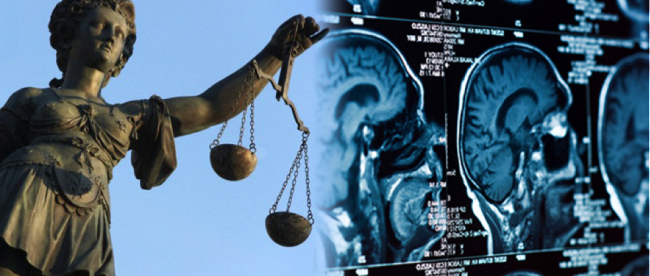The Erosion of Free Will and Its Legal Implications

By Noah Danielson
The state of our knowledge about “free will” is still very unsettled. Much of the research in this field is the subject of hotly contested debate and answers to many important questions remain up in the air. However, a number of studies have corroded the edges of a previously widely accepted principal: that human decisions are the result of conscious choices. This idea is central to the retributivist theory of justice, by which a willful wrongdoer’s blameworthiness subjects them to punishment.
Human Understanding of Our Conscious Choice
In a study published in the Journal of Neurology, Neurosurgery and Psychiatry, researchers found that transcranial stimulation – magnetic stimulation of the nerve cells in the brain – could impact human choices. Researchers asked participants to randomly raise their hand 50 times. Prior to stimulation, a right-handed person would select their right hand 60% of the time. After transcranial stimulation, the same person would select their left hand 80% of the time. Interestingly, participants still reported that they believed their choices had been made freely.
The results suggest that the conscious mind may mistakenly believe that conscious intent is the impetus for an action, when in actuality there is an outside cause. This opens the door to the possibility that our decisions may not always be the result of our own conscious intent. Other studies have implied similar conclusions.
Determining which human actions are within the conscious control may be a fool’s errand. Indeed, there is intuitive appeal to the idea that the mind does not have sufficient time to consciously influence an action in split-second decisions, whereas humans can still make conscious decisions in longer contemplated scenarios. Additionally, most experiments on decisions and free will examined short-term decisions (on the order of milliseconds), while not addressing decisions made after extended contemplation.
Criminal Law and Conscious Choice
The criminal law of murder and manslaughter seems to track these intuitive understandings of human conscious and contemplative choice. While both murder and manslaughter involve the killing of one person by another, they differ in their legal definitions and in the practical consequences for those facing accusations or convictions.
In a murder prosecution the government must prove the killer purposefully killed another person, whereas in a voluntary manslaughter prosecution the government must only prove that the killing occurred in the heat of passion after the killer was provoked. Because manslaughter occurs over a very short timeframe, it is consistent with a conception of “free will” that casts some doubt on the ability of humans to consciously control actions over the short term. In this way, someone who commits manslaughter is considered less culpable than someone who commits murder because provocation means the killer had less time for contemplation. By punishing manslaughter less harshly than murder, the criminal codes of many states seem to embody (whether purposefully or not) the idea that people may be less able than previously thought to mitigate their own behavior in split-second decisions.
Many states distinguish between first and second-degree murder using similar reasoning. First-degree murder occurs when a killer plans to kill someone and then carries out that plan; second-degree murder is an unplanned, but still intentional killing. The law considers first degree murder the most reprehensible type of killing in part because it is planned and considered beforehand. As a result, first-degree murder convictions carry longer prison terms. Harsher punishments for first-degree murder is consistent with the idea that there is greater room for conscious decisions in ideas contemplated over a longer period.
But not all states follow this rationale. For example, states using the Model Penal Code do not distinguish first and second degree murders. This suggests that not all states determine culpability based on the time available for premeditated conscious contemplation.
These codes align with the intuitive understandings of “free will”. This may be problematic, however, if future scientific studies confirm the idea that actions are not solely the result of our own volition. Here, the retributive function of criminal law – which states that punishment is justified when deserved – is a flawed way of justifying criminal punishment for unplanned murders committed in a short timeframe.
If humans lack a meaningful ability to consciously act in these situations, they are less “blameworthy” and therefore less deserving of punishment. We would also be unable to justify punishment under a deterrence-based rationale. How can we deter criminal conduct if an actor’s actions are not consciously controlled? This leaves incapacitation as the central reason to subject an offender to punishment.
Incapacitation offers to make society safer by physically removing criminals from society and isolating them in prison. Insofar as certain people would commit crimes if not restrained, it makes sense to remove them from society regardless of whether these offenders are blameworthy. However, if incapacitation is the justification for punishment, it should alter the way in which the punishment is carried out and viewed by society. If the offenders have decreased blameworthiness, there is no reason to subject them to punishments above and beyond what is necessary to prevent them from causing harm. And importantly, the hatred directed at those who commit these crimes (though understandable) is perhaps misplaced, especially where considerable doubt may exist as to whether the offender had the ability to consciously make a different choice.
The results of future studies into “free will” may further erode the idea of conscious decision-making or, conversely, may reaffirm the belief that human actions are the result of volition. Hopefully, the future legal doctrine in homicide and other areas (as well as the public perception of these crimes) will track the revelations or confirmations of scientific research. It is important that law evolve to make sense of the realities of the world instead of stubbornly conforming to an understanding of culpability simply because it has been around for many years.
